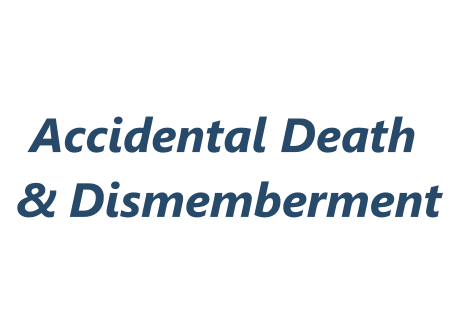
Accidental Death & Dismemberment (AD&D) Benefit
The Accidental Death & Dismemberment lump sum benefit is paid directly to you for injuries originating from a covered accident if the injury from the accident causes death, dismemberment, or loss of sight, speech or hearing within 365 days from the date of the accident.
Accidental Death Benefit for Group Term Life:
The Accidental Death Benefit is paid directly to your beneficiary in a lump sum amount if you experience a covered loss resulting from an accidental injury, if the injury causes death within 90 days from the date of the accident.
Schedule of Benefits:
| Principal Sum | $50,000 |
|---|---|
| Loss of Life | 100% |
| Loss of Both Hands | 100% |
| Loss of Both Feet | 100% |
| Loss of the Entire Sight of Both Eyes | 100% |
| Loss of One Hand and One Foot | 100% |
| Loss of Speech and Hearing | 100% |
| Loss of One Hand and One Foot and Entire Sight of One Eye | 100% |
| Loss of One Hand or One Foot | 50% |
| Loss of Entire Sight of One Eye | 50% |
| Loss of Speech or Hearing | 50% |
| Loss of Hearing in One Ear | 25% |
Accident Death and Dismemberment Benefits are providing as shown in the Schedule of Benefits and pays the member or beneficiary up to the benefit amount listed for the member's death or dismemberment due to a covered accident.
Percentage related to the Principal Sum benefit as shown above for the Primary, Spouse and Child(ren)
Eligible members are members of NCBA and under the age of 65.
Not available in all States
The information contained herein is offered as insurance industry guidance and provided as an overview of current market risks and available coverages and is intended for discussion purposes only. This publication is not intended to offer legal advice or client-specific risk management advice. Any description of insurance coverages is not meant to interpret specific coverages that you may already have in place or that may be generally available. General insurance descriptions contained herein do not include complete insurance policy definitions, terms and/or conditions, and should not be relied on for coverage interpretation. Actual insurance certificates must always be consulted for full coverage details and analysis.